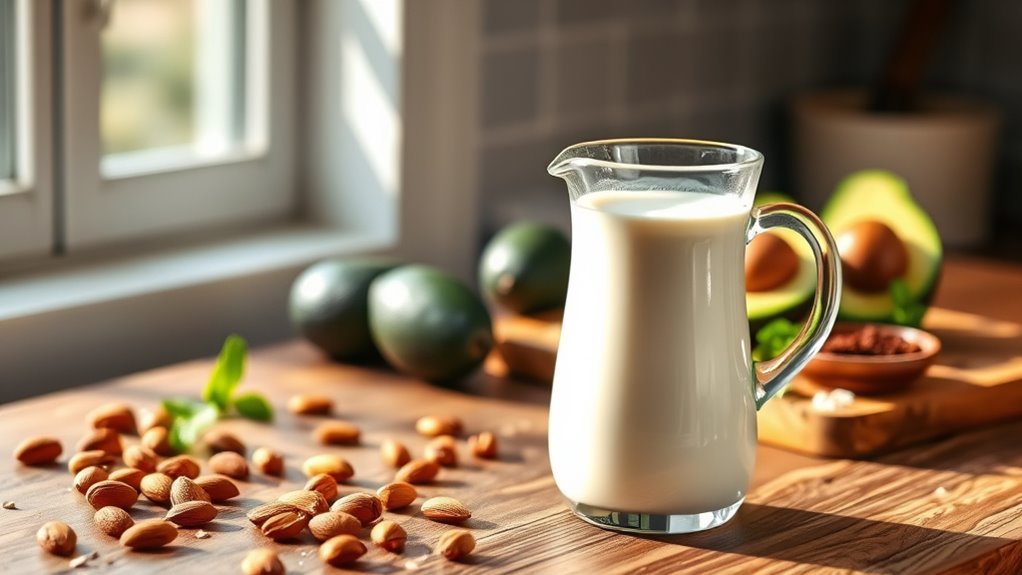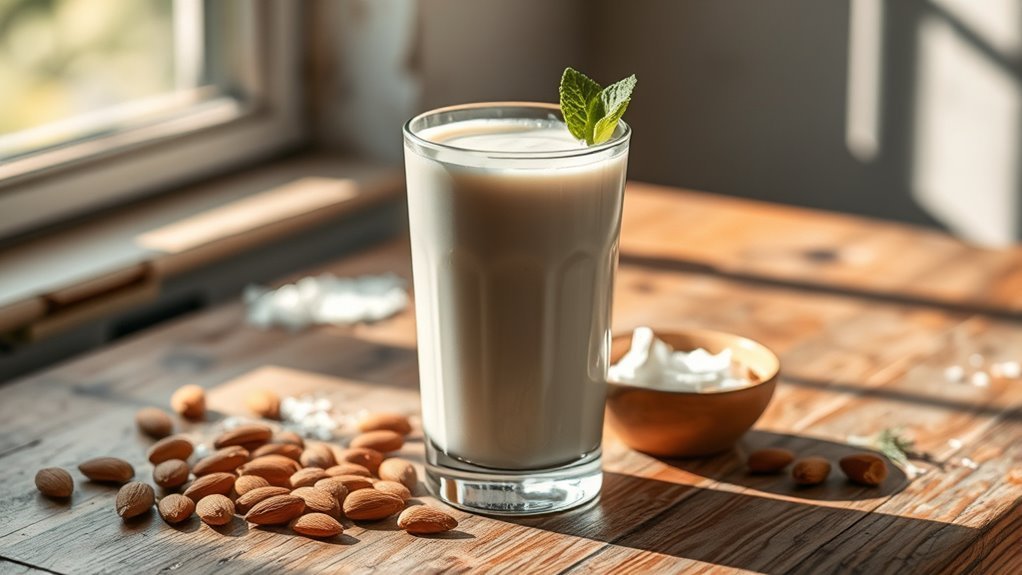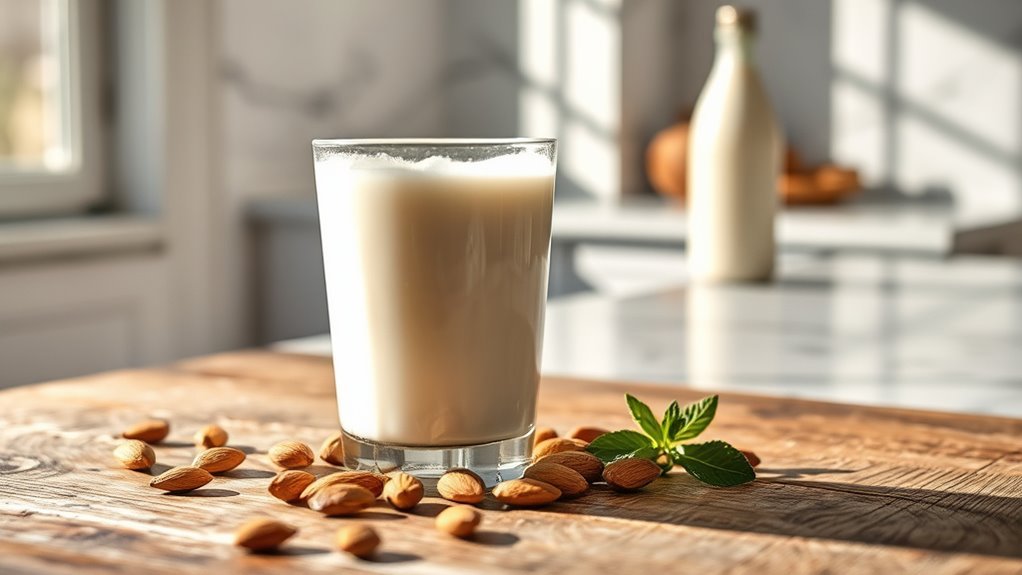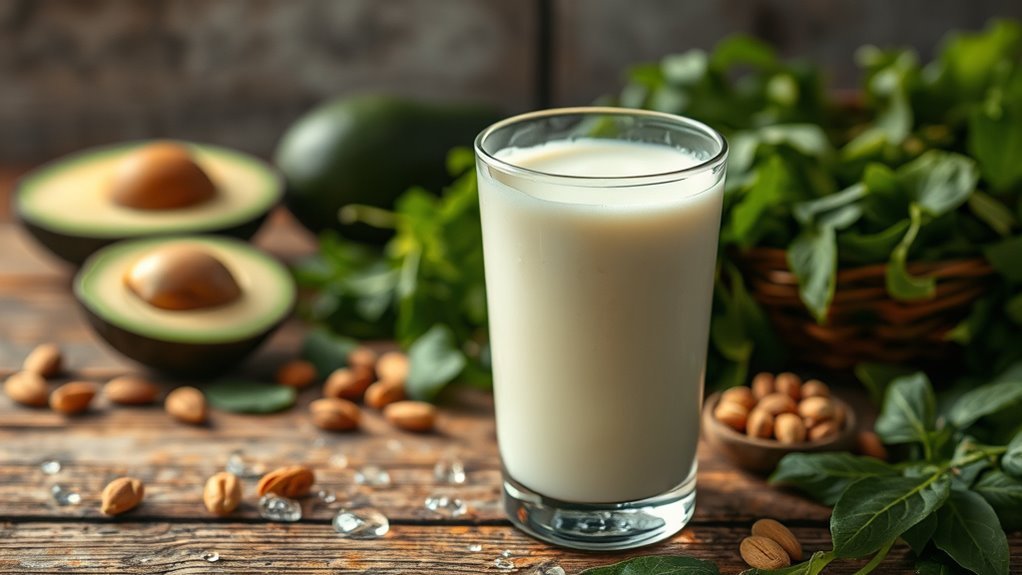You can include milk in your keto diet, but you need to be selective. Whole milk has about 12 grams of carbs per cup, which can impact your carb limit. Opt for low-carb alternatives like unsweetened almond milk or coconut milk, which contain just 1-2 grams of carbs. Full-fat dairy like cheese and heavy cream can also be beneficial. Make wise choices to maintain ketosis, and there’s more to explore regarding dairy options and their benefits.
Understanding Carbohydrates in Milk

While many people enjoy milk for its taste and nutritional benefits, understanding its carbohydrate content is essential for those following a ketogenic diet. Milk contains lactose, a type of milk sugar, which contributes to its overall carbohydrate breakdown. This sugar can impact your daily carb intake, making it vital to read labels carefully. For example, a cup of whole milk typically contains about 12 grams of carbs, which can add up quickly if you’re not mindful. If you’re seeking to maintain ketosis, you might consider alternatives like unsweetened almond or coconut milk, which generally have lower carb counts. Ultimately, being aware of the carbohydrate content in milk can help you make informed choices aligned with your dietary goals.
Types of Milk and Their Carb Content

When choosing milk on a ketogenic diet, it’s important to contemplate the variety, as different types have varying carbohydrate contents. Whole milk contains about 12 grams of carbs per cup, which may not align with your keto goals. In contrast, unsweetened almond milk has only 1-2 grams per cup, making it a favorable option. If you’re lactose intolerant, lactose-free milk can be a choice, but it still holds similar carb levels to regular milk. Nutritional comparisons between these options can help you maintain ketosis while enjoying dairy. For those seeking freedom in their diet, being mindful of the types of milk you select is essential to stay within your carb limits and support your health goals.
Keto-Friendly Milk Alternatives

Exploring keto-friendly milk alternatives can open up a world of options that fit seamlessly into your dietary plans. By choosing the right alternatives, you can enjoy creamy textures and rich flavors without compromising your carb limits. Here are some great options:
- Almond Milk: Low in carbs and versatile for both sweet and savory dishes.
- Coconut Milk: Creamy and delicious, perfect for smoothies or curries.
- Cashew Milk: Slightly sweet and perfect for coffee or cereal.
- Hemp Milk: Nutritious and packed with omega-3 fatty acids; it’s a great dairy alternative.
These nut milk and coconut milk options not only help you maintain ketosis but also add variety to your meals, giving you the freedom to explore new culinary adventures.
Incorporating Dairy Into Your Keto Diet
Incorporating dairy into your keto diet can be a delicious way to enhance your meals while staying within your carb limits. Dairy products like cheese, heavy cream, and Greek yogurt offer numerous dairy benefits, including a good source of healthy fats and protein. They can help you feel full and satisfied, making it easier to stick to your keto lifestyle. However, if you’re lactose intolerant, you’ll want to choose lactose-free options or limit your intake of high-lactose dairy products. By being mindful of your choices, you can enjoy the rich flavors and textures dairy brings to your meals without compromising your health goals. Embrace the versatility of dairy while maintaining your freedom within the keto framework!
Tips for Choosing Dairy Products on Keto
Choosing the right dairy products is key to maximizing the benefits of your keto diet while minimizing your carbohydrate intake. Focus on high-fat, low-carb options to keep your diet on track. Here are some tips to help you choose wisely:
- Opt for full-fat dairy to increase your dairy fat intake and support ketosis.
- Look for products labeled as “low-carb” or “keto-friendly” to avoid hidden sugars.
- If you’re lactose intolerant, consider lactose-free options or dairy alternatives like coconut or almond milk.
- Incorporate hard cheeses and Greek yogurt, which are lower in carbs and high in protein.
Frequently Asked Questions about Milk on Keto
1. Can I drink milk on a keto diet?
While traditional cow’s milk contains carbohydrates, you can still enjoy it in moderation on a keto diet. Whole milk has about 12 grams of carbs per cup, which can take up a significant portion of your daily carb allowance. If you want to include milk in your keto diet, consider using smaller amounts in recipes or switching to lower-carb alternatives like unsweetened almond milk or coconut milk.
2. What types of milk are best for a keto diet?
The best types of milk for a keto diet are those that are low in carbs. Unsweetened almond milk, unsweetened coconut milk, and heavy cream are excellent choices. Almond milk contains about 1-2 grams of carbs per cup, while coconut milk has around 6 grams. Heavy cream is also low in carbs, with about 1 gram per tablespoon, making it a great option for adding creaminess to your dishes without a carb overload.
3. How does lactose affect my keto diet?
Lactose is the sugar found in milk, and it can impact your carb intake on a keto diet. If you are lactose intolerant or sensitive to lactose, you might want to avoid regular milk and opt for lactose-free alternatives that often have less sugar or carbs. Products like heavy cream or hard cheeses are typically lower in lactose and are more keto-friendly.
4. Can I use milk in my keto recipes?
Yes, you can use milk in your keto recipes, but you should choose wisely to keep your carb count low. Opt for heavy cream or a low-carb milk alternative when cooking or baking. For instance, heavy cream can replace milk in sauces or soups for a richer flavor without significantly increasing your carb intake.
5. How can I replace milk in keto-friendly drinks?
If you want to replace milk in drinks while following a keto diet, consider using alternatives such as unsweetened almond milk, coconut milk, or heavy cream. These options provide a creamy texture without the high carb content of regular milk. You can also use unsweetened soy milk or even add a little water to heavy cream to create a milk-like consistency for smoothies or coffee.
References
- https://www.healthline.com/nutrition/keto-diet-foods
- https://www.medicalnewstoday.com/articles/321008
- https://www.webmd.com/diet/what-is-the-keto-diet
- https://www.ncbi.nlm.nih.gov/pmc/articles/PMC6019055/
- https://www.diabetes.org/nutrition/healthy-foods/keto-diet
- https://www.thekitchn.com/keto-diet-foods-22979534
- https://www.eatthis.com/keto-diet-foods-to-avoid/
- https://www.nutrition.gov/topics/nutrition-101/dietary-guidelines


